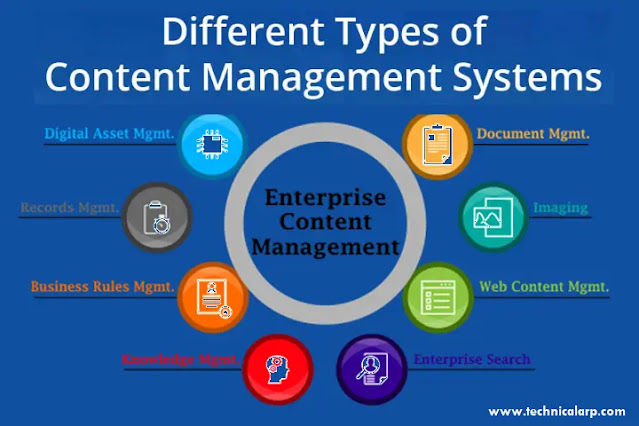Enterprise content management (ECM) is a popular tool among businesses of all sizes. It enables organizations to store, access, and manage their content in an organized fashion for maximum efficiency and long-term strategy. But how do you choose the right ECM system for your organization?
This blog post will explore the different types of content management systems, like document management systems and enterprise management systems.
 |
| Types of Content Management Systems |
With this knowledge, you'll be able to select better an ECM solution that fits your needs and achieve success with your content management solutions.
What is enterprise content management?
Enterprise content management (ECM) is a strategy for managing an organization's unstructured data, or "content." This includes documents, images, emails, and other forms of information. ECM tools and strategies are designed to help businesses better manage this content throughout its lifecycle - from creation to archival.
When done correctly, ECM can improve business efficiency and productivity by making it easier for employees to find and use the needed content. It can also help businesses meet compliance requirements and protect sensitive information.
However, implementing an ECM solution can be complex and costly. Organizations should carefully consider their needs and objectives to ensure success before selecting a solution.
They should also work with experienced ECM consultants who can help them design and implement a system that meets their specific needs.
Different Types of Content Management Systems
Many different types of content management systems are on the market today. But which one is right for your organization? Here is a brief overview of the different types of ECM systems to help you make the best decision for your business:
1. Document management systems
Document management systems (DMS) are designed to manage large volumes of digital documents, such as text files, images, and PDFs. DMS typically includes check-in/check-out, versioning, and workflow features.
Some DMS also includes capabilities for managing physical documents (e.g., scanning and indexing).
2. Web content management systems
Web content management systems (WCMS) are designed to manage the content of websites. WCMS typically includes templates, versioning, workflow, and collaboration. They are powerful tools for managing website content and allowing teams to collaborate on projects.
So, Properly implementing a WCMS is essential for unlocking its full potential and achieving success. Many WCMSs also support multiple languages and can be used to manage mobile content.
3. Social media management systems
Social media management systems (SMMS) are designed to help organizations effectively manage their social media presence. SMMS typically include social listening, publishing, analytics, and reporting features. Some SMMS also offer capabilities for managing paid social media advertising campaigns.
4. Digital asset management systems
Digital asset management systems (DAM) are designed to store and organize rich media assets, such as images, video, and audio files. DAM typically includes centralized storage, versioning, search, and access control. Many DAM systems offer support for multiple file formats and cloud-based storage.
5. Enterprise content management
An Enterprise content management system (ECMS) is designed to manage large volumes of unstructured data across an entire organization. ECMS typically includes workflow, advanced search, and digital rights management features. Some ECMS also offer capabilities for managing corporate intranets and extranets.
Conclusion
In conclusion, various content management systems are available for businesses. Each comes with unique features and benefits that can help your organization make the most efficient use of its information resources.
It is important to take the time to research each system carefully to determine which one offers the best fit for your particular needs.
So, With this analysis in hand, you can be sure that you will select an ECM system that allows you the greatest control and efficiency over your valuable data.
Thanks for reading. See you in another article.

ConversionConversion EmoticonEmoticon